新牛津译林版高中英语必修一unit 2《growing pains》grammar优秀教案(重点资料).doc
新牛津译林版高中英语必修一unit 2《growing pains》language reading优秀教案(重点资料).doc
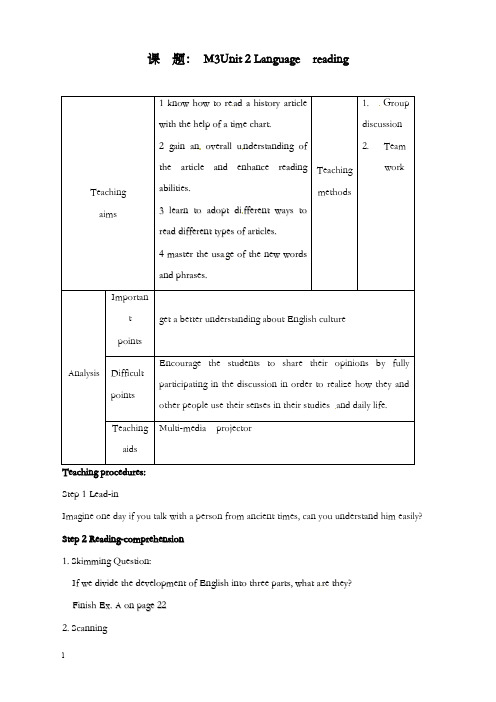
Analysis
Important
points
get a better understanding about English culture
Difficult
points
Encourage the students to share their opinions by fully participating in the discussion in order to realize how they and other people use their senses in their studies and daily life.
During the Renaissance in the 16th century
Modern English began
Step 5 Consolidation
Activities:
Organize students into groups of four. One is a linguistic expert and the other three are journalists. An expert English linguist will make a brie f introduction about the development of the English language.
4) What was the German plural form replaced by?
5) Which King of England made Englis h used as the official language?
6) When did Modern English appear?
牛津译林版高中英语必修一Unit 2《Growing pains》(Practise the lan
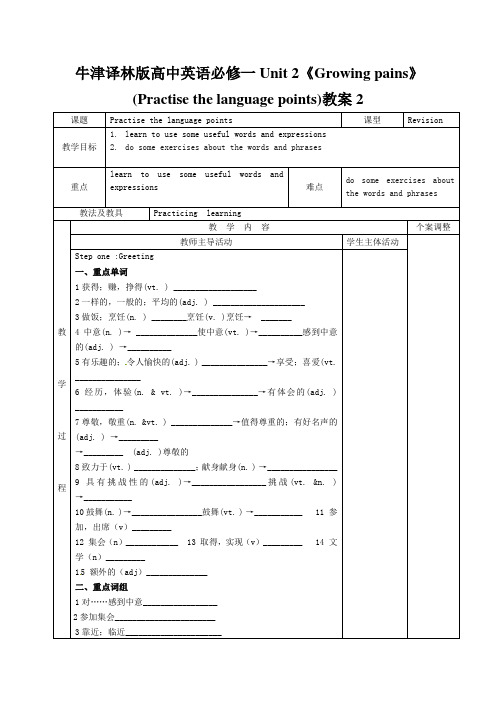
牛津译林版高中英语必修一Unit 2《Growing pains》(Practise the language points)教案2课题Practise the language points 课型Revision教学目标1.l earn to use some useful words and expressions2.do some exercises about the words and phrases重点l earn to use some useful words andexpressions 难点do some exercises aboutthe words and phrases教法及教具Practicing learning教学过程教学内容个案调整教师主导活动学生主体活动Step one :Greeting一、重点单词1获得;赚,挣得(vt. ) ___________________2一样的,一般的;平均的(adj. ) _____________________3做饭;烹饪(n. ) ________烹饪(v. )烹饪→ _______4中意(n. )→ ______________使中意(vt. )→__________感到中意的(adj. ) →__________5有乐趣的;令人愉快的(adj. ) _______________→享受;喜爱(vt._______________6经历,体验(n. & vt. )→_______________→有体会的(adj. )___________7尊敬,敬重(n. &vt. ) ______________→值得尊重的;有好名声的(adj. ) →_________→_________ (adj. )尊敬的8致力于(vt. ) ______________;献身献身(n. ) →________________9具有挑战性的(adj. )→_________________挑战(vt. &n. )→___________10鼓舞(n. )→________________鼓舞(vt. ) →___________ 11 参加,出席(v)_________12 集会(n)____________ 13 取得,实现(v)_________ 14 文学(n)_________15 额外的(adj)______________二、重点词组1对……感到中意_________________2参加集会_______________________3靠近;临近______________________4听起来像_______________________教学过程教学内容个案调整教师主导活动学生主体活动5过去常常________________________6花费时刻做某事_________________7免费___________________________8在……终止时____________________9喜爱;喜爱______________________10回忆,回忆_____________________11谋生___________________________12向某人表示尊重_____ ____________13致力于,献身于_________________14平均起来;平均_________________15为……而奋斗__________________16获得高分__________________17取笑__________________________18 中意地_____________________19交换___________________________20 玩得快乐_______________________三、重点句子(20’)1.在英国上了一年的中学对我来说是一段专门令人愉快和兴奋的经历。
牛津译林版必修一Unit2《Growingpains》word教案(4)

答案: A 关系词在句中作状语,所以用where 。
英语: Unit2 《 Growing pains 》教案( 4)(译林牛津版 必修 1)一. 教学内容:Unit 2 Growing Pains二. 教学目标:掌握 Unit 2 语法定语从句三. 教学重难点:复习介词+关系代词引导的定语从句掌握关系副词引导的定语从句(一)Great changes are taking place in the city ______ they live. The film __________ I' m speaking is to be shown at the People ' s Cinema next week.This is the teacher ________ we ' ve learnt a lot.The policeman __________ Mr Henry is talking in the office is a friend of mine.1. Shanghai is the city _____ I first visited in China.Shanghai is the city _____ I began my first job. Shanghai is the city _____ greatly attracts me. 2. This is the family _____ I was treated well.This is the family _____ helped me a lot.3. Do you know the reason ________ he is late for school?Do you know the reason ________ he gave to you for his being late is false? 4. I can still remember the sitting-room my mother and I used to sit in the evening.A. whatB. whichC. thatD. where 答案: D 首先找到定语从句, my mother and I used to sit in the evening ,修饰 thesitting room, 将先行词带入从句中形成一个完整的句子: my mother and I used to sit in the sitting room in the evening, 所以这里应该为 in which=where 。
牛津译林版高中英语必修1Unit 2Growing painsReading教案4

Unit 2《Growing pains》Period 2 Reading 1(Comprehension focus)Teaching objectives:◆To develop students’ ability of reading a play◆To know about American family life and problems that happen between Americanteenagers and their parents◆To form a positive attitude towards solving problems between teenagers andparentsImportant and difficult points:Learn to analyze the emotions of each character from the instructions of the play. Teaching procedures:Step 1 Lead-in:Get students to think about the following questions:Have you ever watched the famous American TV comedy “Growing Pains”?Could you list some of the members of the family? (Show them a photo and tell them the family members.)What do you think of the play?If you were left alone, can you imagine what might happen?Step 2 readingPlease go through the Reading strategy and tell me how to read a play.(make sure students know how to read a play.)First reading:Get students to read the play and finish Part A individually.Answers1.Eric,Daniel, Mom and Dad.2. The room was a mess./ There was trash all over the place.3. Spot was ill.Second reading1.Mom and Dad were back from their holiday a week earlier.2.Eric was happy when seeing his mother.3. Parents left Daniel in charge.4.The boys spent the money seeing the vet for Spot.5.The room was very clean and tidy when their parents came back.6.Daniel didn’t have a chance to explain what had happened.7.Mom felt regretful for what they said to Daniel.8.Boys didn’t use up the money from their parents.Word studyChoose the correct one:1.I just finished my vacation to Yunnan.A. workB. holiday2. The man explained to the people that the factory had been close. to give meaning of sth. B. to give a reason for sth.3. When I went into the room, I found the room was in a mess.a difficult state B. a dirty or untidy state4. A teacher should trust his students.look after B. believe that sb. is good5. The woman was mad at the dog for eating her shoes.A. worriedB. angry6. It is rude to run into other’s house without knocking at the door.A. not politeB. anxiousDetailed reading1.Please read Act One of the play carefully and fill in the form2. Please read Act Two carefully and fill in form:Role-playDivide students into groups of five and one is the narrator and the others are the main characters. Role-play Act One and Act Two.Discussion1.Suppose you were one of the children what would you do?2.How do you think good parents should treat their children?3.Do you think there is a generation gap between you and your family? How can you deal with it?Homework:1 Write an end to the play.2 Role-play the dialogue in groups of five.。
新牛津译林版高中英语必修一unit 2《growing pains》language welcome 优秀教案(重点资料).doc
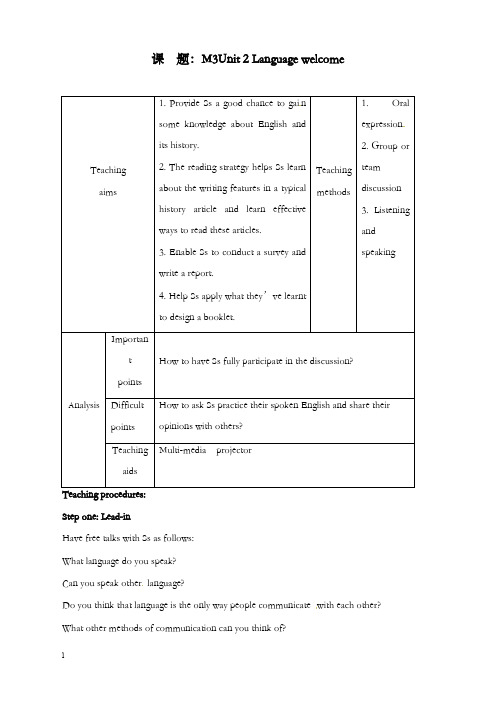
课题:M3Unit 2 Language welcome1. Provide Ss a good chance to gaiexpressionStep one: Lead-inHave free talks with Ss as follows:What language do you speak?Can you speak other language?Do you think that language is the only way people communicate with each other? What other methods of communication can you think of?Step two: Picture talkingPicture 1: languagesDo you speak any other language besides Chinese? If so, can you speak a little for us?Which other language do you like to learn best, English, Japanese or Spanish? Why?Which language do you think is the hardest? Why?Picture 2: EmotionsWhat does this emotion stand for? ( A beaming喜气洋洋的, 愉快的smile.)What is an emotion?An intense mental state that arises subjectively rather than through conscious effort and is often accompanied by physiological changes; a strong feeling:冲the emotions of joy, sorrow, reverence, hate, and love.快乐、痛苦、尊敬、痛恨和爱的冲动When do people usually use this kind of language?(When they are talking on the Internet or sending short messages.)Could you give some more example s?(For example: ☹( :-( )stands for sadness; ☺( :))stands for happiness; :-o stands for surprise.) Picture 3: Sign languageWhat does this sign mean in Britain? (good luck)Do you thin k the same sign means the same to people all over the world? If you think so, can you show some examples and explain them?( Take the American gesture OK for example. Making a circle with one’s thumb and index finger(食指, first finger/forefinger) means ‘money’in Japan but ‘zero’in France. Who needs to use sign language in their daily lives?(Deaf peo ple or those who are unable to hear)Have you ever used sign language?Is it helpful for you to communicate with others? Picture 4: BrailleA system of writing and printing for visually impaired or sightless people, in which variedarrangements of raised dots representing letters and numerals are identified by touchWhat is Braille? (A special language for blind people)Who invented Braille? ( A Frenchman called Louis Braille)Have you heard about him?What did he do for blind people? (He invented a special language for them, so it was named after him.)Picture 5: Animal languageWhy do bees fly in circles? ( To inform their partners about food and danger)Do you believe animals can ‘talk’?If possible, ask Ss to share their stories about animal language they know.Step three: DiscussionEncourage Ss to discuss the three questions listed under the five pictures on page 21Then ask them to exchange their opinions and report their responses back to the whole class. Answers for discussion:1. WE have many other ways to exchange ideas or information.For example: Chinese people relayed fire signals at night and smoke signals in the day from one Great Wall watchtower to another in ancient times.To use pigeons to send messages in the past timeNowadays, to use the language of flowers to communicate meaningRose = love; tulip= formal announcement of love郁金香Forget-me-not = k eeping me in your memory. 勿忘草2. Chinese is the most spoken language, while English is the most widely used around the world.It’s useful to learn English if you want to travel, do business, or study abroad.What’s more, in 2008, the 29th Olympic Games will be held in Beijing. We are learning English to welcome people from other parts of the world.3. To learn English well, different people have different methods or ways.Step four: Listening1. Have Ss listen to tape and finish listening exercises on page 1042. Check answers together.Homework: 1. Go over what are learned in class.2. Do some reading on page 102教学反思:。
牛津译林版高中英语必修一Unit2《Growingpains》教案

牛津译林版高中英语必修一Unit2《Growingpains》教案Teaching Aims 1 Learn about what noun clausesintroduced by question words are,the functions of each clause and theword order of the clause.2 know th e empty subject it acts ast he grammatical subject of thesentence and in what situations it isoften used.Teachingmethods1.Groupdiscussion2.Team workAnalysis ImportantpointsNoun clauses.DifficultpointsNoun clauses introduced by question words. TeachingaidsMulti-media projectorI. Noun clauses introduced by question wordsStep 1 引导名词性从句的连词分为三种:连词that连接代词 who, whom, whose, which, what连接副词 when, where, how, why 等。
Step 2 从整句结构和从句结构的分析入手1 Who was responsible for the accident is not yet clear? 连接代词2 You can begin to see why English has such strange rules. 连接副词3 My idea is that we should spend our holidays b y the seaside.连词 thatII. Empty subject itStep 1 Try to find the real subjectIt is important for us to learn English well today.It is no use wasting your time reading such books all day.Conclusion: the subject is a nou n clause, a to-infinitive or a v-ing form. (PartA on Page 31Step 2 Translation:1 要把握一门外语是困难.It is hard to master a foreign language.To master a foreign language is hard.Read Part 1 on Page 30.Step 3 Rewrite the sentencesIt seems that he speak two languages.= He seems to speak two languages.My new neighbor happens to come from my hometown.=It happens that my new neighbor come from my hometow n.Draw students’ attention to P art 2 on page 30.Step 4 how to emphasize the eleme nt in a sentence by using Empty Subject it Jane gave Mary a handbag at Christmas.It was Jane that / who gave Mary a handbag at Christmas.It was Mary that Jane gave a handbag (to) at Christmas.It was a handbag that John gav e Mary at Christmas.It was at Christmas that John gave Mary a handbag.Conclusion: It + be的一定形式+被强调部分+that /who分句形式主语和形式宾语的应用:当主语从句比较长,主句比较短时,通常用形式主语it,而把从句放在后面,如:(1)It is said that they have succeeded in working out the problem.(2)It was important that we should make the plan carefully.(3)It remains a secret how the animals came to live in the sea.当宾语从句后面有补语的时候,我们也需要用形式宾语it, 而将宾语从句放在补语之后,如:(1)I found it very difficult that one learns several languages at the same time.(2)He thinks it necessary that we should be given more time practising oral English.(3)He made it clear that he would leave the office soon.Step 5 ConsolidationGrammar1. 1. promise v. 许诺,承诺。
译林牛津版必修1高中英语Unit2 Growing pains
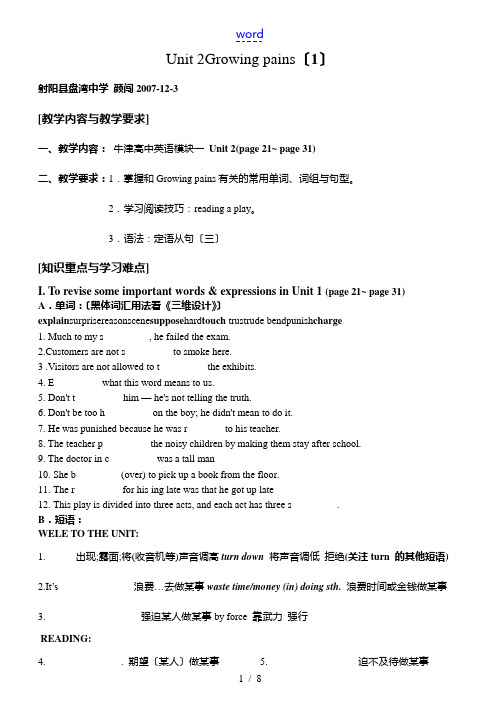
wordUnit 2Growing pains〔1〕射阳县盘湾中学颜闯2007-12-3[教学内容与教学要求]一、教学内容:牛津高中英语模块一Unit 2(page 21~ page 31)二、教学要求:1.掌握和Growing pains有关的常用单词、词组与句型。
2.学习阅读技巧:reading a play。
3.语法:定语从句〔三〕[知识重点与学习难点]I. To revise some important words & expressions in Unit 1 (page 21~ page 31)A.单词:〔黑体词汇用法看《三维设计》〕explain surprisereasonscene suppose hard touch trustrude bendpunish charge1. Much to my s_________, he failed the exam.2.Customers are not s_________ to smoke here.3 .Visitors are not allowed to t_________ the exhibits.4. E_________ what this word means to us.5. Don't t_________ him — he's not telling the truth.6. Don't be too h_________ on the boy; he didn't mean to do it.7. He was punished because he was r_______ to his teacher.8. The teacher p_________ the noisy children by making them stay after school.9. The doctor in c_________ was a tall man10. She b_________(over) to pick up a book from the floor.11. The r_________ for his ing late was that he got up late12. This play is divided into three acts, and each act has three s_________.B.短语:WELE TO THE UNIT:1.______出现;露面;将(收音机等)声音调高turn down 将声音调低拒绝(关注turn 的其他短语)2.It’s_______________浪费…去做某事waste time/money (in) doing sth.浪费时间或金钱做某事3.__________________ 强迫某人做某事by force 靠武力强行READING:4._______________. 期望〔某人〕做某事5._________________ 迫不及待做某事6._________________ 采纳某人的建议7.sb. ________________ 某人应该做某事;某人被要求,期望或认为做某事8._______ /___________ 对待处理应付9.______________________某事由某人负责10._____________________ 某任负责某事11._____________〔灯,火,蜡烛等〕熄灭12._____________使某事被做〔让人〕做某事表示主语的遭遇13._________________ 值得/应当/活该做某事14.____________ 对某人苛刻=be strict with sb15.________________________ 想要做某事16._____________________ 将A看作B /把B 当作A来看待WORD POWER:17._______…=be different in…. 在…方面不同18.______________=A be different from B A 和B不同19.___________…胜任/适合…..20.___________. 适合/胜任做某事21.____________ 保持健康22.____________将A换成B________________将A 变成B23._________________. 同某人换某物24.__________…. 要/找…..II. Sentences to be recited:1.Eric runs in after it, followed by a big dog,walking very slowly.(P22)Eric sits on his bed looking at Daniel, who has his arms crossed and looks angry.(P23)followed by a big dog / walking very slowly / looking at Daniel在句中作伴随状语。
英语知识点牛津译林版高中英语必修一Unit2《Growingpains》(Gr

英语知识点牛津译林版高中英语必修一Unit2《Growingpains》(Gr课题:M1U2 Growing pains【教学目标】1.To introduce and develop the theme of growing pains.2.To develop speaking ability by talking about families and problems that happenbetween teenagers and parents.3.To know more about classmates and their families.【教学重点】Get students to understand what growing pains means.【教学难点】Help students to form a positive attitude towards relationships between their parents and them.Multi-media projectorIn this part, Ss are encouraged to say something about theirhappen when kid s are between the ages of 3 and 5 or 8 and 12.Do you love your parents?Ask Ss to l ook at the pictures a nd discuss each picture inWhat does the boy want to do? Is he allowed to do so? Why or Did the boy do well in his exams?fully as po ssible with their own words. Make sure that Ssto report their opinDo you think there is a generation gap between you and your parents? If s o, what is the best way to solve the problem?。
牛津译林版高中英语必修一Unit 2《Growing pains》(word powder)教案
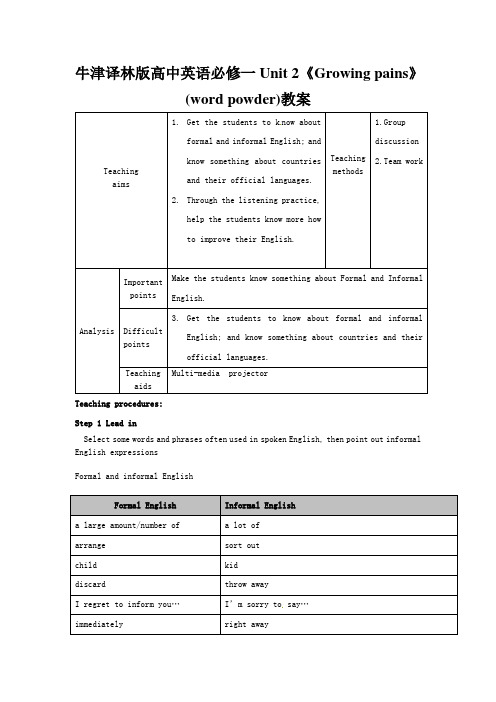
牛津译林版高中英语必修一Unit 2《Growing pains》(word powder)教案Teaching aims 1.Get the students to k now aboutformal and informal English; andknow something about countriesand their official languages.2.Through the listening practice,help the students know more howto improve their English.Teachingmethods1.Groupdiscussion2.Team workAnalysis ImportantpointsMake the students know something about Formal and InformalEnglish.Difficultpoints3.Get the students to know about formal and informalEnglish; and know something about countries and theirofficial languages.TeachingaidsMulti-media projectorTeaching procedures:Step 1 Lead inSelect some words and phrases often used in spoken English, then point out informal English expressionsFormal and informal EnglishFormal English Informal Englisha large amount/number of a lot ofarrange sort outchild kiddiscard throw awayI regret to inform you…I’m sorry to say…immediately right awayin addition plusIt is my hope…Hop e…prevent stoppurchase buyreply answ erspeak to have a word withStep2 PracticeAsk students to practice what they have learnt above.First point out the informal places while they are reading the letter.Then rewrite the letter in formal English.Answers:Dear Mr. Smith,I want to speak to you about the condition of the playground. I regret to inform you that people do not discard their rubbish properly. They leave rubbish on the ground instead of using the bins. Yesterday a 6-year-old child fell and cut his hand on a broken bottle. The boy was taken to hospital immediately. In addition, the beautiful vie w of the park is spoiled.I believe that there are a large number of actions you could take to solve this problem. For example, you should purchase additional litter bins and a rrange security to prevent people from littering.It is my hope that you will take my concerns into consid erat ion. I look forward to your reply.Yours sincerely, Jerry BrokerStep3Word power ( Group work )1. How many languages are spoken in the world today?( About 6,000)2. Do you know the ten most widely spoken languages? What are they?( They are Chinese, English, Hindi, Spanish, Russian, Arabic, Bengali, Portuguese, Malay and French..)①. Organize students into groups o f four and provide each group with a word map. Have each group write down as many names of countries and their official languages as possible.Use the following diagram as a pattern to organize the information.Country Official language(s) Country Officiallanguage(s)Australia English Mexico SpanishBengal Bengali New Zealand English, MaoriCanada English, French Portugal P ortugueseChinese Chinese Russia RussianEgypt Arabic Saudi Arabia ArabicFrance French Singapore English, Chinese, Malay, Tamil Germany German Spain SpanishIndia English, Hindi Switzerland French, German, ItalianIreland English, Irish U. k EnglishItaly Italian USA English②. Then have students finish Part A and share their answers with their group members.Step 4 Listening practiceAsk students to do the exercises in Parts A and B in listening on page 98 i n their Workbook. Let them know more about how to improve their English.Step5 Summary and homeworkWe’ve known something about formal and informal English, deal with s ome words and expressions related to languages, and go over the names of countries and their language(s).Use these skills to enlarge or reinforce your vocabulary and try your best to improve your English.Homework:1.Go over what we learned in this period.2.Preview the next lesson3.To get more information about UN, according to the website given to you . 教学反思:。
牛津译林版英语高一上册Module1Unit2Growingpains之二
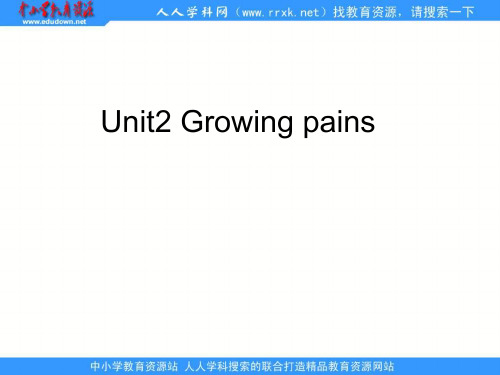
• 3) Daniel’s parents still think of him as an adult.
• 4) The boys did not clean the house bucause they went to the clinic.
• Purpose: To think the methods of solving the
problems between parents and teenagers. And tell them to have a positive attitude towards these things.
• Step5 Homework
• Step4 Post-reading
• 1.Role play:Each group acts as a role. • 2.Debate • Have a debate about “Do you think Eric and
Daniel will explain to their parents what has happened? Or will the parents go and ask the boys what has happened?
• 5) Eric does not want to explain to their parents.
• 3. Answer the following questions based on your comprehension.
• 1)What are the boys doing when their parents come home?
• Step 2 Pre-reading
牛津译林版必修一Unit2 growing pains

Module1Unit 2 Growing Pains新课标单词短语act n. (戏剧的)一幕vi. 表现;行动curtain n. 窗帘;(舞台上的)幕布surprise vt. 使吃惊,使惊奇be supposed to 应该……,应当……bend vi.&vt. 弯腰,屈身;(使)弯曲touch vt. 触摸;接触do with 处理,处置explain vt.&vi. 解释,说明mess n. 混乱,杂乱,一团糟sink n. 水泥,水槽,洗碗池garbage n. 垃圾can n. 罐子,金属容器leave vt. 使……处于某种状态,听任charge n. 负责,掌管adult n.成年人reason n. 原因,理由trust vt. 信任unpunished adj. 免受惩罚的teenager n. (13-19岁的)青少年fault n. 过错,错误go out (灯)熄灭mad adj. 狂怒的;疯狂的not ... anymore 不再,再也不hard adj. 苛刻的,严厉的be hard on 对……苛刻,对……要求严格now that 既然;由于rude adj. 粗鲁的,无礼的punish vt. 惩罚explanation n.解释,说明cash n.现金boring adj.令人厌倦的,乏味的,无聊的mark n.分数;标志,记号test n.&vt.混合;混淆,弄混mix up 混淆,弄乱;搅匀,拌和score n.&vt.使……感兴趣silly adj.愚蠢的sincerely adj.真诚地as though 好像,似乎insist on 坚持,坚持认为charge n. 负责,掌管adult n.成年人reason n. 原因,理由trust vt. 信任unpunished adj. 免受惩罚的teenager n. (13-19岁的)青少年fault n. 过错,错误go out (灯)熄灭mad adj. 狂怒的;疯狂的not ... anymore 不再,再也不hard adj. 苛刻的,严厉的be hard on 对……苛刻,对……要求严格now that 既然;由于cafe n.咖啡馆,小餐馆Internet cafe 网吧chat vt.&n.聊天,闲谈valuable adj.时间段,时期,阶段at present 目前,当前argument n.争论,辨论;论点,论据freedom n.自由relationship n.关系mainly adv.主要地;大体上suggest vt.建议;暗示,使想起fight vi.争吵,争论;打架,争斗crazy adj.发疯的,疯狂的like crazy 发疯似地,拼命地spare adj.空闲的;多余的selfish adj.自私的unloving adj.缺乏爱心的forbid vt.禁止Truly adv.真诚地;真实地课文出现短语1. turn up2. a waste of time3. try to do sth4. force sb to do sth5. spend time (in) doing sth6. be supposed to do sth7. in charge8. shout at9. give sb a chance to do sth10. deserve to do sth11. instead of12. be hard on sb13. now that14. be rude to sb15. feel like doing sth16. be different from sth17. in the form of18. pay attention to19. think of20. search…for21. a little bit 22. be proud of23. stay up24. mix up…with25. ask for sth26. stop doing sth27. mean to do sth28. keep in mind29. tidy up30. be angry with31. clean up32. a bit of33. at all34. invite sb to do sth35be busy with sth36. used to do sth37. be used to do sth38. be .used to doing sth39. refuse to do sth40. as though41. insist on42. prevent sb from doing sth43. forbid sb from doing sth44. argue about sth with sb45. allow sb to do sth46. do with47. go out48. not…any more49. after all50. at present51. like crazy52. choose…from53. can’t wait to do sth54. go unpunished55. should have done sth56. be nervous about sth57. all the time58. get sth done59. at the moment60. miss doing sth61. advise sb to do sth62. make a bit of difference63. be fit for64. ask to do sth,65. happen to sb一.单词应用根据单词的首字母或汉语意思填写正确单词,注意形式变化。
牛津译林版高中英语必修一Unit2《Growingpains》(Homealone)教案
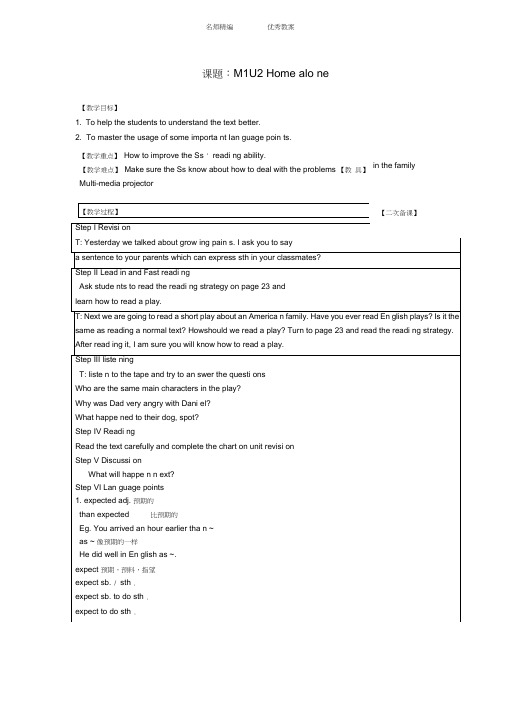
课题:M1U2 Home alo ne【教学目标】1. To help the students to understand the text better.2. To master the usage of some importa nt Ian guage poin ts.【教学重点】 How to improve the Ss ' readi ng ability.【教学难点】 Make sure the Ss know about how to deal with the problems 【教 具】Multi-media projectorin the family【二次备课】expect that …①我们谁也没预料到这种情况。
No ne of us expected it .我在等他的来信。
I ' m expecting his letter .③不要对他期望太咼。
Don' t expect too much of him.你预计什么时候回来?When do you expect to be back? 你别指望他会支持你。
You can' t expect him to support you .我想他会很快回来的。
I expect that he ' II come back soon 她会不会来呢?”“我想会/不会。
”“Will she come? ”“ I expect so/ not. ”2. surprise1). vt. 使惊奇;使惊讶What you said surprised me.I am surprised at what you said just now.What surprised me most was that the little boy could speak En glish so well. 2). adj. surprising 令人吃惊的surprised 吃惊的;受惊的a. It is that they lost.b. I am that they lost.c. She wore a look whe n she came into the room.n.令人惊奇的事(可数)吃惊;惊奇It was a pleasant surprise to see them again.To my surprise, he came back so soon.3. followa. 跟随you go first, an d I ' ll follow later.听从,采纳1 ' II follow your advice follow one's exampleb. followi ng vs. followedfollowi ng 接下来的,随后的in the followi ng years/ days分词作伴随作为现在分词跟过去分词,构成的短语可以充当状语,但意思相反A teacher came into the classroom, followed by a group of Ssfollow ing a group of Ss(一群学生紧跟其后,跟在一群学生后面)She sat at the table, readi ng a magaz ine.He stood there, not knowing what to do.4 be gone用完了,不在了I need to buy sth to drink, because all mywater is gone.5. in charge (of sth/sb) 负责,掌管某事主管,掌管;在……管辖之下,由……照顾* sb. be in charge of sth.某人负责,掌管,照顾* sth. be in the charge of sb. /in one s charge在……掌管之下,由……经管1. Mary is in charge of the hospital.The hospital is in the charge of Mary.2. The project is in the charge of Dr Gre . en.Dr Gree n is in charge of the project.* free of charge=for free6. stopa) ~ doing~ to dob) 停止某人做某事~ sb ( from ) doing sth=preve nt sb (from) doing sth=keep sb from doing sth7. have sb/sth doing have sb / sth doa. have …do ing 让…一直做某事b. have …do 让…做某事c. have sth done 使某事被做遭遇,经历8. deserve~ to do 应该做某事,值得做某事They ~ to know the truthThey didn ' t ~ to win.He killed a young lady and he deserved to be put intoprison.Tom did wrong and deserved puni shme nt/to be puni shed.9. in stead of vs. in steadIn stead of 后接的动作或状态是不做的In stead 连在一起的句子中的动作或状态是要执行的或存在的The water here is not good, so I am drinking beer in stead. we ll have fish in stead of meat for lun ch.10. With + 名词(代词) +介词短语/形容词/副词/分词/不定式He stood there with his hands in his pockets.She said goodbye with tears in his eyes.The teacher came in with a book in his han ds.Do you know the man with a child in her arms/With nothing to do , I went shopp ing.The boy lay on the grass, with his eyes look ing at thesky.She stepped out of the prison with her hands tied.11. leavea. 把…交给,委托…leave + n+ to/with+n 把… 托付给/委托给~ sb to do sth 委托某人做某事b. 使…处于某种状态! +n + adj./ 现在分词、过去分词、名词、介词短语Mrs Anny left her daughter with /to us and went shopping.The gover nment will leave buildi ng the museum to thatcompa ny.What he said left me thinking deeply.12 You weren' t supposed to come home until tomorrow!1 be supposed to do sth.发现者号航天飞机应该在8月8日返回.Shuttle Discovery was supposed to retur n on Aug 8 .校会应该在周一早晨举行.The school assembly was supposed to be held on Mon day morni ng.2 sup .pose …怎么样?Suppose you have ano ther try.Suppose we have an En glish party.3 suppos ing 假女口Suppos ing it rains, what will you do?Suppos ing he is late, shall we go first?=If ......13 I feel like we have to - punish h im or he …feel like如果想要,我们可以外出散步If you feel like, we can go out for a walk.我现在不想要大吃一顿.I don ' t feel like (having) a big meal now这种材料摸起来象丝绸.【教学后记】。
牛津译林版高中英语必修一Unit2GrowingpainsSectionⅣ
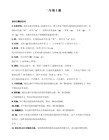
Unit 2Growing painsSection ⅣWriting假设你是李华,你的英国朋友Peter来信向你咨询如何才能学好中文。
请你根据下列要点写一封回信。
要点:1.参加中文学习班;2.看中文书刊、电视;3.学唱中文歌曲;4.交中国朋友。
注意:1.词数100左右;2.可适当增加细节,以使行文连贯;3.开头语已为你写好。
April 8,2011Dear Peter,I'm glad to receive your letter asking for my advice on how to learn Chinese well.________________________________________________________________________ ________________________________________________________________________ ________________________________________________________________________ ________________________________________________________________________ ________________________________________________________________________ ________________________________________________________________________ ________________________________________________________________________ ________________________________________________________________________ ________________________________________________________________________ ________________________________________________________________________ Best wishes,Li HuaApril_8,2011 Dear_Peter,I'm_glad_to_receive_your_letter_asking_for_my_advice_on_how_to_learn_Chinese_well.Here_are_a_few_suggestions.First,it is important to take a Chinese course,as you will be able to learn from the teacher and practice with your fellow students.Then,it also helps to watch TV and read newspapers,books and magazines in Chinese whenever_possible.Besides,it should be a good idea to learn and sing Chinese songs,because by doing so you'll learn and remember Chinese words more easily.You can also make more Chinese friends.They will tell you a lot about China and help you learn Chinese.Try and write to me in Chinese next time.Best_wishes,Li_Hua这是一封建议信。
- 1、下载文档前请自行甄别文档内容的完整性,平台不提供额外的编辑、内容补充、找答案等附加服务。
- 2、"仅部分预览"的文档,不可在线预览部分如存在完整性等问题,可反馈申请退款(可完整预览的文档不适用该条件!)。
- 3、如文档侵犯您的权益,请联系客服反馈,我们会尽快为您处理(人工客服工作时间:9:00-18:30)。
课题:M3Unit 2 GrammartheStep 1 引导名词性从句的连词分为三种:连词that连接代词who, whom, whose, which, what连接副词when, where, how, why 等。
Step 2 从整句结构和从句结构的分析入手1 Who was responsible for the accident is not yet clear? 连接代词2 You can begin to see why English has such strange rules. 连接副词3 My idea is that we should spend our holidays b y the seaside.连词thatII. Empty subject itStep 1 Try to find the real subjectIt is important for us to learn English well today.It is no use wasting your time reading such books all day.Conclusion: the subject is a nou n clause, a to-infinitive or a v-ing form. (Part A on Page 31 Step 2 Translation:1 要掌握一门外语是困难.It is hard to master a foreign language.To master a foreign language is hard.Read Part 1 on Page 30.Step 3 Rewrite the sentencesIt seems that he speak two languages.= He seems to speak two languages.My new neighbor happens to come from my hometown.=It happens that my new neighbor come from my hometow n.Draw students’attention to Part 2 on page 30.Step 4 how to emphasize the eleme nt in a sentence by using Empty Subject itJane gave Mary a handbag at Christmas.It was Jane that / who gave Mary a handbag at Christmas.It was Mary that Jane gave a handbag (to) at Christmas.It was a handbag that John gav e Mary at Christmas.It was at Christmas that John gave Mary a handbag.Conclusion: It + be的一定形式+被强调部分+that /who分句形式主语和形式宾语的应用:当主语从句比较长,主句比较短时,通常用形式主语it,而把从句放在后面,如:(1)It is said that they have succeeded in working out the problem.(2)It was important that we should make the plan carefully.(3)It remains a secret how the animals came to live in the sea.当宾语从句后面有补语的时候,我们也需要用形式宾语it, 而将宾语从句放在补语之后,如:(1)I found it very difficult that one learns several languages at the same time.(2)He thinks it necessary that we should be given more time practising oral English.(3)He made it clear that he would leave the office soon.Step 5 ConsolidationGrammar1. 1. promise v. 许诺,答应。
后面接直接宾语再接不定式,从句,名词代词或不接直接宾语。
(课本p 28 )1) Dad promised (me) to buy me a laptop, but he broke his own word.爸爸答应过(我)要给我买个笔记本电脑,但是他失信了。
2) The student promised (the librarian) that all books would be returned by Friday.那个学生答应(图书管理员)在周五之前归还所有的书。
3) He promised his wife a coat for her birthday.他答应他的妻子买件外套作为生日礼物。
4) ---She’s not coming tonight. 她今晚不会来了。
---But she promised! 但是她答应过的!promise作动词还表示“有希望……,可能会(有)”adj. promising 有希望的5) These discussions promise future storm. 这些争论有可能引起今后的风波。
promise 还可以作名词,意为“诺言,许诺”6) If you make a promise, you must keep it. 假如你做出了许诺,就必须做到。
2 waste (v.)money (课本p 28)a waste (n)of time /money31)deserve +n ~ a reward; ~ a punishment (课本p 29)2)deserve doing ~ punishing3)deserve to do ~to be punished4 4. concern (课本p 29)⑴vt. 涉及,关系到1) The news concerns your brother. 这消息与你兄弟有关。
2) The letter is chiefly concerned with export commodities. 这封信主要是关于出口商品的。
⑵vt. 使担心;使关心1) He is concerned for her safety. 他担心她的安全。
2) He was very concerned about her. 他对她非常关心。
⑶n. 关心的事,重要的事[C];关怀[U]1) That's no concern of mine. 那不关我的事。
2) Andrew expressed his concern. 安德鲁表示了他的关切。
concerned 有关的(作后置定语)1) The man concerned was her husband. 这个相关的人是她的丈夫。
concerning 关于2) We read stories concerning visitors from outer space. 我们读了关于天外来客的故事。
as/so far as …is concerned 就……来说,就……而言3) It is impossible as/so far as I am concerned. 就我而言这是不可能的。
5. ban vt. 禁止,取缔。
过去式和过去分词都为banned. (课本p 29)Swimming in this river is banned. 禁止在此河中游泳。
ban sb. from doing sth. 意为“禁止某人做某事”The government needs to do something to ban people from advertising illegal things on the Internet. 政府应该采取措施禁止人们在网上做广告宣传违法物品。
ban也可做可数名词,意为“禁令,禁止”,表示“对……的禁令”时常用a ban on …的结构。
There is a ban on smoking in this school. 这所学校禁止抽烟。
6 spread n.vt&vi 传播(课本p 29)The spread of AIDS in the last few years has been alarming.过去几年里艾滋病的传播令人惊慌。
I will tell you a secret, but you must promise not to spread it around.我要告诉你一个秘密,但是你必须保证不会将它四处传播。
The disease spread quickly. 这种疾病很快地传播开来。
7 access vt. 接近,使用(课本p 29)You can access the loft by a ladder. 你可以爬梯子上阁楼。
access 也可做名词,意为“接近的机会,享用权;通道,通路”Citizens may have free access to the library. 市民可以免费使用这个图书馆。
The only access to the town is across the bridge. 到镇上唯一的通路是经过一座8.disagree vi. 意见不一,分歧。
反义词:agree 名词:disagreement(课本p 36)常构成的词组有:disagree with sb. 与某人意见不一disagree about/over/on sth. 在某事上意见不一I disagree with you on this point. 我不同意你的意见。
disagree 还可以表示“不一致,不符”The two reports disagree (with each other). 这两份报告(相互)不一致。
disagree 还可表示“不适宜”,常构成词组disagree with sb. 意为“(食物等)对某人不适宜,使某人不舒服”Fried foods disagree with me. 油炸食物对我不适合。
